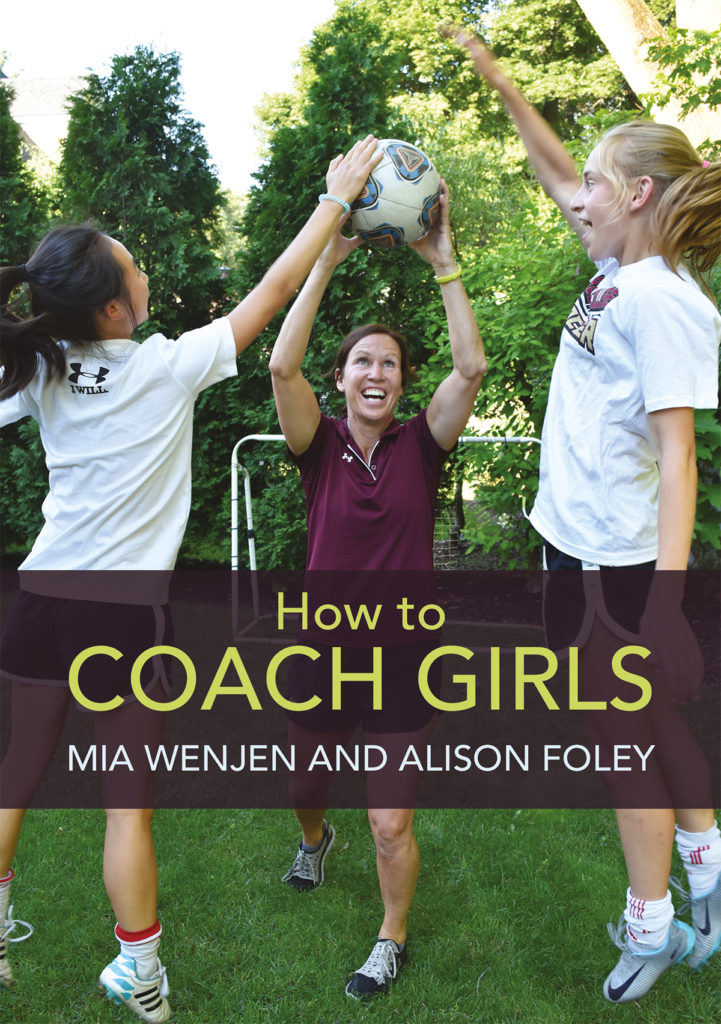Guest post from author and coach, Alison Foley. Previously published for SportsEd.TV
Keeping Teen Girls in Sports
Did you know that 70% of all kids quit organized sports by the age of 13* and that girls quit at 6x at the rate of boys?** The stat from the transition from high school to college is even more disheartening. Only 7% of high school athletes move on to play sports in college.**
SOURCES
** https://www.amazon.com/dp/B000JMKSWY/ref=dp-kindle-redirect?_encoding=UTF8&btkr=1
*** https://www.ncbi.nlm.nih.gov/pmc/articles/PMC4201634/
I wrote How To Coach Girls with Mia Wenjen as a manual for professional and volunteer coaches. In it, I share my experience as the former Boston College Women’s Varsity Head Coach for more than two decades in coaching young women.
The positive aspects of keeping girls in sports are numerous, from positive body image, higher grades, lower rates of pregnancy, and high self-confidence. Some benefits help in their careers, from learning teamwork and leadership skills to accessing networking opportunities.
But what is the secret sauce to keep girls in sports? It’s a simple but elusive one: fun!
What does that mean? How do we translate “fun” into a sport while still making it competitive? Fun has many aspects.
Let’s focus on three:
- Make Her Feel Valued
- See Her as a Whole Person
- Help Her Form Connections with Her Teammates
Make Her Feel Valued
Girls tend to doubt their abilities and value. They worry about fitting in. They worry about failure. Girls need a safe and nurturing environment to feel comfortable trying new things.
The easiest way to make female athletes feel valued is to connect with them. Find a way to praise every player during each practice. Girls are very hard on themselves; they don’t necessarily need someone to point out what they are doing wrong all the time.
Instead, find the moments when they are doing something praiseworthy such as trying something new, mastering a skill that they had been working on, or even exhibiting leadership or compassion.
Let each player know that you, the coach, are looking forward to seeing them … at the next practice, game, and season. Your enthusiasm will help fuel theirs.
See Her as a Whole Person
Your female players want to be seen as a whole person, not just as an athlete with skills. They want you, the coach, to know and appreciate the different aspects of their lives, from their other extracurriculars to their sense of humor to their social relationships.
This takes time, and coaches often have that in short supply, but it’s the key to earning trust. And this trust is necessary for interpreting the coach.
It’s easy for female players to interpret a coach’s words or actions, even if incorrect or unintentional, as “coach doesn’t like me” or “I’m not the coach’s favorite.”
There was a Kindergarten teacher at our elementary school that everyone wanted their child to have. She had the gift of making each of her students feel like they were her favorite. Taking the time to build a relationship with each player tells her that she’s your “favorite.”
Help Her Form Connections with Her Teammates
The social aspect is another reason why sports are fun for girls. Playing different sports and being on different teams allows them to meet new people and make new friends that might be outside of their usual social circles, such as the school that they attend. These social connections can last well beyond the season.
Try using ice breakers at the start of every practice during warm-up. Something as silly as asking questions about their favorite ice cream flavor, or if they have a pet can help them connect with each other.
Another thing to be mindful of is breaking the team into smaller groups. Girls might already be in groups due to carpools that might be formed based on a city or school, and this can lead to cliques. Girls tend to stand next to the people that they know. Instead of letting girls form their groups, have them count off. This naturally mixes up girls with ones that they don’t understand.
From Teen to College
As girls transition from middle school to high school, there can be a drop-off in sports participation. Many sports have tryouts and cuts. Also, only some sports are open to beginners.
If your child is young, be open to having her play different sports. Multi-sport athletes tend to have fewer injuries, burn out less, and learn from being in different roles depending on their “main” versus “fun” sport.
The transition from high school to college is also a time when girls stop playing sports. Remind your daughter of the many options to participate in sports in college, from intramural (try a new sport or one that is just meant for silly fun!) to a club to junior varsity to varsity. College is also a great time to try something new that athletes might not have had time or access to before, such as squash, rock climbing, Zumba, or rugby.
We want our daughters to feel like sports is always an open door for them because it is. It’s a gift that keeps on giving. And you, the coach, are the gift.

Alison Foley is the former Boston College head women’s soccer coach, the winningest coach in BC history, youth National Team scout, and celebrated author of two books; ‘How To Coach Girls,’ and ‘The Elusive Full Ride Scholarship.’ She currently helps high school athletes with the recruiting process.


You can find Alison at foleyathleticadvising.com or email her hello@foleyathleticadvising.com.
Connect with us!
Instagram: https://www.instagram.com/audreypressbooks/
Facebook: https://www.facebook.com/AudreyPress
Pinterest: https://www.pinterest.com/valarie_budayr/

